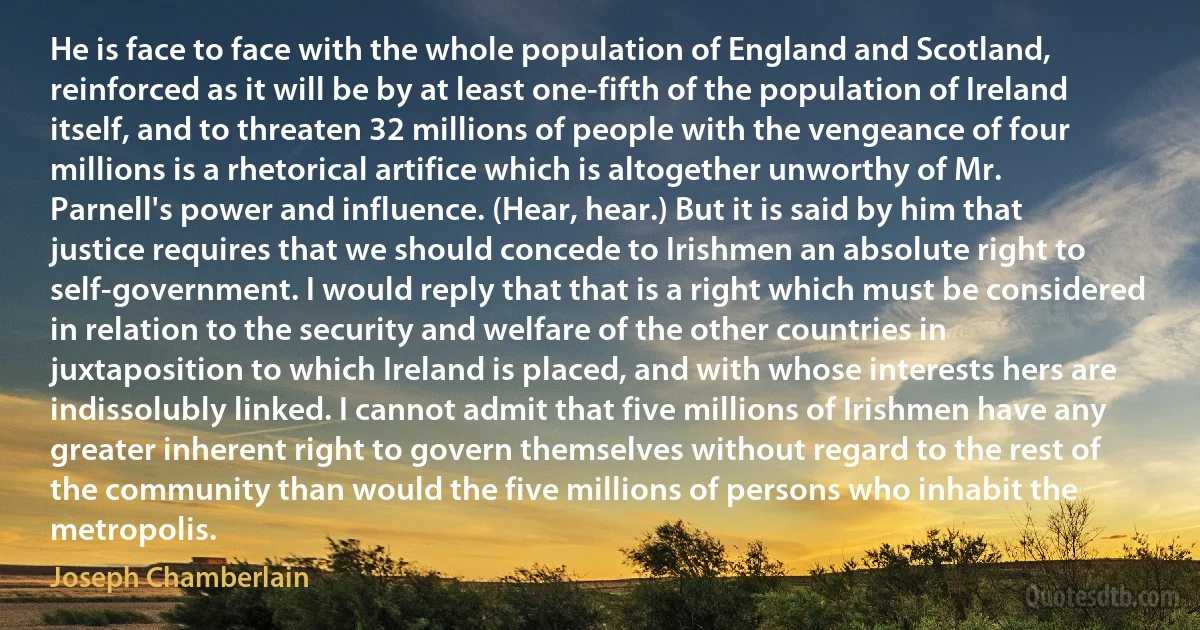
He is face to face with the whole population of England and Scotland, reinforced as it will be by at least one-fifth of the population of Ireland itself, and to threaten 32 millions of people with the vengeance of four millions is a rhetorical artifice which is altogether unworthy of Mr. Parnell's power and influence. (Hear, hear.) But it is said by him that justice requires that we should concede to Irishmen an absolute right to self-government. I would reply that that is a right which must be considered in relation to the security and welfare of the other countries in juxtaposition to which Ireland is placed, and with whose interests hers are indissolubly linked. I cannot admit that five millions of Irishmen have any greater inherent right to govern themselves without regard to the rest of the community than would the five millions of persons who inhabit the metropolis.
Joseph ChamberlainRelated topics
artifice face five four govern hers justice juxtaposition metropolis people power reply rest rhetorical right say security self-government should unworthy vengeance ScotlandRelated quotes
If they will abandon the habit of mutilating, murdering, robbing, and of preventing honest persons who are attached to England from earning their livelihood, they may be sure there will be no demand for coercion. Well, you will be told you have no alternative policy. My alternative policy is that Parliament should enable the Government of England to govern Ireland. Apply that recipe honestly, consistently, and resolutely for 20 years, and at the end of that time you will find that Ireland will be fit to accept any gifts in the way of local government or repeal of coercion laws that you may wish to give her. What she wants is government-government that does not flinch, that does not vary-government that she cannot hope to beat down by agitations at Westminster-government that does not alter in its resolutions or its temperature by the party changes which take place at Westminster.

Robert Gascoyne-Cecil, 3rd Marquess of Salisbury
Scotland and Ireland were virtually disfranchised; Edinburgh and Glasgow, the two largest cities of Scotland, had each a constituency of only thirty-three members. A majority of the members of the House of Commons were elected by six thousand voters. This state of affairs afforded ready opportunities for the moneyed aristocracy to buy seats in Parliament, by the purchase of a few voters in rotten boroughs ; and also enabled the ministry to secure a servile majority in the Commons. The corruption resulting from these conditions, as exhibited in the latter half of the eighteenth century, can hardly be realized by the present generation. They afford, however, an illustration of the universal truth, that a government which does not draw its inspiration of liberty, justice, and morality from the people will soon become both tyrannical and corrupt.

James A. Garfield
For Greek democracy failed, and the reasons for its failure are full of instruction. The great ruling ideas which the Greeks gave to the world, ideas which England later was to absorb and spread over a quarter of the globe, freedom and self-government, social equality and civic patriotism, these were corrupted by demagogues and flatterers of the people. It was so fatally easy to think that freedom meant doing what you like, that one man was not only as good as another but equally able to fill any office whatsoever, that majorities could do no wrong, that you could make Utopian laws for your own country without regard to what other nations or other empires were doing...Freedom of speech was stifled and public men who refused to advocate pleasures for the public multitude were banished. Politicians rivalled one another in bribing the electorate.

Stanley Baldwin
If any person had told the Parliament which met in terror and perplexity after the crash of 1720 that in 1830 the wealth of England would surpass all their wildest dreams, that the annual revenue would equal the principal of that debt which they considered an intolerable burden, that for one man of £10,000 then living there would be five men of £50,000, that London would be twice as large and twice as populous, and that nevertheless the rate of mortality would have diminished to one half of what it then was, that the post-office would bring more into the exchequer than the excise and customs had brought in together under Charles II, that stage coaches would run from London to York in 24 hours, that men would be in the habit of sailing without wind, and would be beginning to ride without horses, our ancestors would have given as much credit to the prediction as they gave to Gulliver's Travels.

Thomas Babington Macaulay
It is admitted that the power of taxing the people and their property is essential to the very existence of Government, and may be legitimately exercised on the objects to which it is applicable, to the utmost extent to which the Government may choose to carry it. The only security against the abuse of this power is found in the structure of the Government itself. In imposing a tax, the legislature acts upon its constituents. This is, in general, a sufficient security against erroneous and oppressive taxation. The people of a State, therefore, give to their Government a right of taxing themselves and their property, and as the exigencies of Government cannot be limited, they prescribe no limits to the exercise of this right, resting confidently on the interest of the legislator and on the influence of the constituent over their representative to guard them against its abuse.

John Marshall
